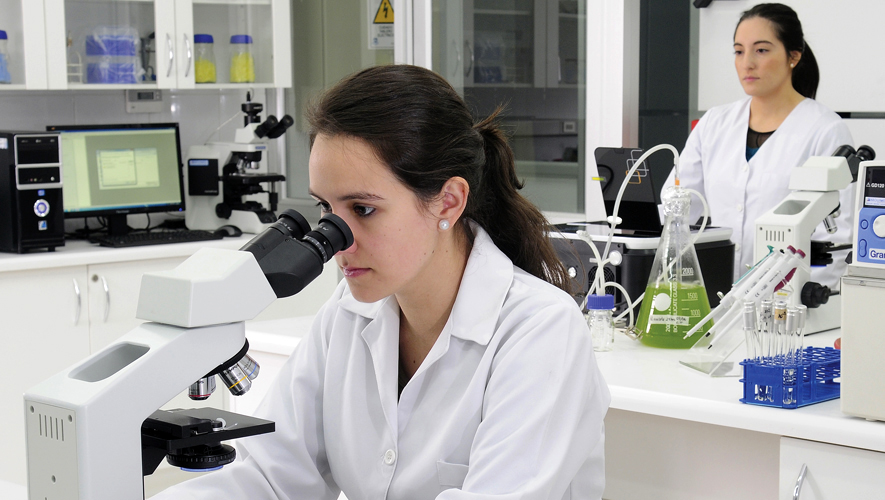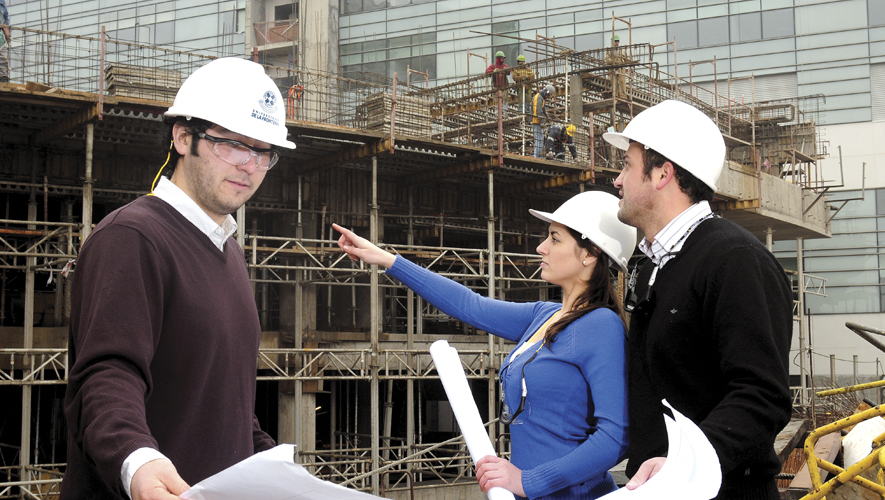BIOCHEMISTRY

| Professional Degree: |
| Biochemist |
| Academic Degree: |
| Graduate in Biochemistry |
| Code: |
| 30073 |
| Duration: |
| 10 semesters |
| Study arrangements: |
| Semi-annual, daytime, semi-flexible curriculum |
| Director: |
| Dra. Ana Mutis T. This email address is being protected from spambots. You need JavaScript enabled to view it. This email address is being protected from spambots. You need JavaScript enabled to view it. Phone: 45 - 2325438 |
Program Information
A Biochemist, trained at the Universidad de La Frontera, is a professional in the field of biochemistry, with a solid training in sciences and the skills to work in the fields of bioresources, biomedicine, bioanalysis, and other similar disciplines. He is a professional, able to apply chemical and biological concepts, with the aim to resolve problems and develop innovative systematic projects, which allow the conservation of biota and their environment, and therefore, the improvement of the quality of life of people.
Occupational field
A Biochemist has an extensive knowledge in basic sciences, biochemistry, physical chemistry, molecular biosciences, and in instrumental, analytical, microbiological and advanced bioinformatics techniques. This allows him to improve technologies and to create, develop, innovate and implement solutions to agri-food and environmental problems. He is also able to integrate himself into multidisciplinary scientific and technological teams in the fields of environment, food, agricultural production, health, biotechnology and others. The basic and applied training qualifies the graduate to work in agribusiness, biotechnology and scientific companies of the public or private sector, to practice his profession independently as a consultant or advisor in the scope of his discipline, or to continue his training through advanced postgraduate studies, in order to contribute to the regional and national economic development.
COMPUTER ENGINEERING

| Professional Degree: |
| Computer Engineer |
| Academic Degree: |
| Graduate in Engineering Sciences |
| Code: |
| 30086 |
| Duration: |
| 10 semesters |
| Study arrangements: |
| Semi-annual, daytime, semi-flexible curriculum |
| Director: |
| Dr. Jorge Hochstetter Diez This email address is being protected from spambots. You need JavaScript enabled to view it. Phone: 45 - 2744217 |
Program Information
A Computer Engineer, graduated from the Universidad de La Frontera, is a professional with a comprehensive training, with an innovative and critical spirit regarding the society, its organizations and his own work within it. He is qualified to apply the appropriate and necessary knowledge, skills and technologies to the practice of computer engineering, as well as to formulate and evaluate computer engineering projects in its technological, administrative and organizational aspects.
Occupational field
A Computer Engineer, graduated from the Universidad de La Frontera, can work in the business, commercial, industrial and service field, as a software engineer, the head of computer engineering projects, an information system business consultant, in information technology management, planning computer system strategies and in computer management. He can also work in the design of data network support, usage and maintenance of computer systems, technology watch, database administration and other areas related to information and communication technologies.
CIVIL ENGINEERING IN BIOTECHNOLOGY


| Professional Degree: |
| Civil Engineer in Biotechnology |
| Academic Degree: |
| Graduate in Engineering Sciences |
| Code: |
| 30090 |
| Duration: |
| 12 semesters |
| Study arrangements: |
| Semi-annual, daytime, semi-flexible curriculum |
| Director: |
|
Dr. Christian Vergara Ojeda |
*Access to this Program via Civil Engineering Common Plan
Program Information
A Civil Engineer in Biotechnology, trained at the Universidad de La Frontera, is a professional with the skills to work in the fields of processes, projects and management of production systems, which are used in biotechnology.
He is trained in basic sciences, engineering sciences, and especially in biological sciences and biotechnology tools, the formulation, evaluation and development of projects and management and administration of human and material resources. This allows him to design biotechnological products or processes, formulate, direct, evaluate and control biotechnological projects, control, operate, and direct productive plants, and to identify problems and implement solutions related to industrial activities.
He has the capacity to communicate in a globalized world and to put together and lead work teams. He is socially responsible, innovative, committed, critical with the results of his decisions and respects the rules that govern the society in which he operates.
His basic and applied training allows him to work in industries that use cellular processes for the production of products required by the market, to work independently as a consultant or advisor, to undertake business initiatives and to continue studies in the different areas of engineering and/or biotechnology, in order to contribute to the economic and social development of the country.
Occupational field
A Civil Engineer in Biotechnology, graduated from the Universidad de La Frontera, is qualified to work:
• In all types of labor markets related to the use of biological systems, living organisms and their derivatives or components for the production of required products;
• the productive industrial sector, particularly in process industries whose production systems involve the use of living organisms and their derivatives or components;
• engineering consultancy firms in the area of his specialty;
• senior management activities in the public and private sector;
• self-employed, as an entrepreneur, consultant or advisor in his field.
CONSTRUCTION ENGINEERING


| Professional Degree: |
| Construction Engineer |
| Academic Degree: |
| Graduate in Construction Engineering Sciences |
| Code: |
| 30007 |
| Duration: |
| 10 semesters |
| Study arrangements: |
| Semi-annual, daytime, semi-flexible curriculum |
| Director: |
|
Ing. Paolo Macaya Vitali |
| ingenieriaenconstruccion.ufro.cl |
Program Information
A Construction Engineer, trained at the Universidad de La Frontera, has solid knowledge in basic sciences and engineering applied to construction processes. He also has a professional specialization based on technological management in construction, and competences that allow him to manage and lead projects and companies of his field, always oriented to achievement and quality, considering the efficient use of resources and their responsibility in the environment. His solid training, including ethical values, enables him to solve technical and technological problems, to make decisions and to guide the materialization and inspection of a construction project in different productive sectors of the national scope.
Occupational field
The training of a Construction Engineer at the Universidad de La Frontera allows the graduate to work in construction companies; consultancy firms and public organisms dedicated to the fields of construction, road works, urbanization, hydraulic works, etc.; participating in the formulation, evaluation, planning , management, control and inspection of construction projects and other technical studies of the field. Additionally, he has the skills to do technical tasks related to the manufacture, commercialization and transformation of different products and components for construction, and to do the quality control of them.
CIVIL TELEMATICS ENGINEERING


| Professional Degree: |
| Civil Telematics Engineer |
| Academic Degree: |
| Graduate in Engineering Sciences |
| Code: |
| 30074 |
| Duration: |
| 12 semesters |
| Study arrangements: |
| Semi-annual, daytime, semi-flexible curriculum |
| Director: |
|
Dr. Ramiro Donoso F. |
*Access to this Program via Civil Engineering Common Plan
Program Information
A Civil Telematics Engineer, trained at the Universidad de La Frontera, is a professional with the skills to work in the fields of telecommunication and computer science, management and projects. His training allows him to integrate resources, create, innovate, project, implement and maintain the operation of efficient systems for the community and industry in different areas of application in telematics engineering.
He is trained in basic sciences, engineering sciences, and especially in the fields of communication systems and data networks, software development for generic platforms, information technologies and business process management, which provide analytical, methodological and technical capabilities.
He has the capacity to communicate in a globalized world and to put together and lead work teams. He is socially responsible, innovative, committed, critical with the results of his decisions and respects the rules that govern the society in which he operates.
His basic and applied training allows him to work in productive and service companies in the public or private sector, to work independently as a consultant or advisor, to undertake business initiatives and to continue studies in order to contribute to the economic and social development and of the country.
Occupational field
A Civil Telematics Engineer can work:
• in telecommunication companies, system integration and internet services;
• regional, national or foreign productive companies or service institutions of the private or public sector;
• consultancy and service companies;
• self-employed, as an independent entrepreneur in the field of design and implementation of data networks, services, internet, software development, integration of digital communication systems, as a consultant and service provider, or as a contractor;
• in telecommunication service and equipment representing companies, data transmission and other digital communication systems.




